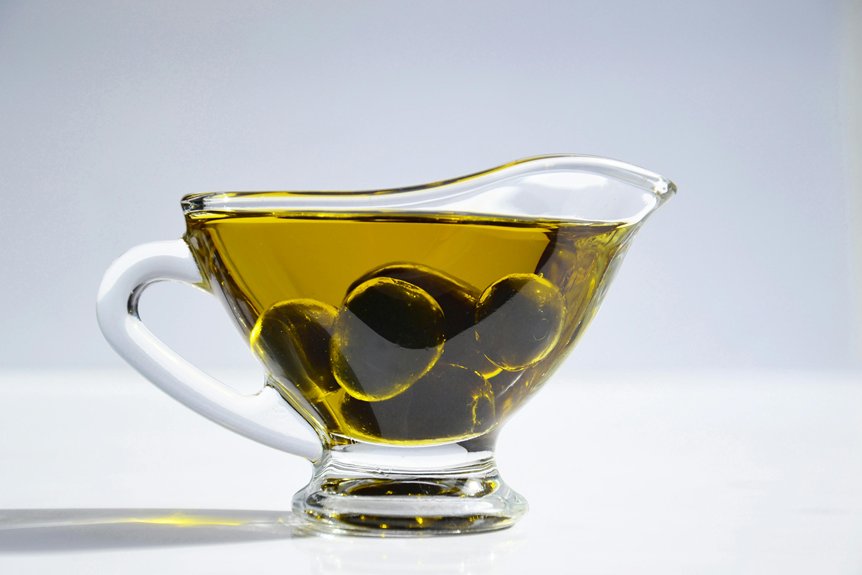
Imagine standing at a culinary crossroads, where two oils beckon with their unique benefits and flavors. Choosing between coconut oil and olive oil isn’t just about cooking; it’s about aligning with your health goals and taste preferences. Each oil brings something different to the table, from heart health to baking versatility. So, which one should you really use in your kitchen? Let’s explore the distinct advantages of each and find the best fit for your cooking style.
Nutritional Profiles of Coconut Oil and Olive Oil
When you’re choosing between coconut oil and olive oil, it’s essential to evaluate their nutritional profiles, as each offers unique benefits. Coconut oil is primarily saturated fat, specifically medium-chain triglycerides (MCTs), which can provide quick energy and may support weight management. On the other hand, olive oil is rich in monounsaturated fats, known for promoting heart health and reducing inflammation. Both oils contain antioxidants, but olive oil boasts a higher level of polyphenols, which contribute to its anti-inflammatory properties. Additionally, Gundry MD Olive Oil is sourced from Moroccan olive trees, resulting in a higher concentration of beneficial polyphenols. If you’re looking for a versatile oil for various cooking methods, consider how each oil’s smoke point might affect your dishes. Ultimately, understanding these nutritional differences can empower you to choose the right oil for your culinary needs.
Health Benefits of Olive Oil
Olive oil stands out not just for its flavor but also for its impressive health benefits. By incorporating it into your diet, you can support your well-being in several ways:
- Heart Health: Olive oil is rich in monounsaturated fats, which can help lower bad cholesterol levels and reduce the risk of heart disease.
- Antioxidant Properties: It’s loaded with antioxidants, such as vitamin E and polyphenols, that combat oxidative stress and inflammation in your body.
- Weight Management: Using olive oil may aid in weight control, as it promotes feelings of fullness and helps regulate appetite.
Choosing olive oil not only enhances your dishes but also empowers your health journey. So, why not embrace this liquid gold and enjoy its benefits?
Health Benefits of Coconut Oil
Coconut oil offers a unique array of health benefits that can enhance your overall well-being. Rich in medium-chain triglycerides (MCTs), it provides quick energy and may boost metabolism. These MCTs also possess antimicrobial properties, helping to fend off harmful bacteria and fungi. Plus, coconut oil is known for its potential to improve heart health by raising HDL (good) cholesterol levels.
Using coconut oil can also support brain function, making it a great addition to a healthy lifestyle. It may even aid in weight management, as MCTs can promote feelings of fullness. So, if you’re seeking a versatile oil that aligns with your journey to better health, coconut oil might just be your new best friend. Embrace its benefits and liberate your cooking!
Culinary Uses and Flavor Profiles
While both coconut oil and olive oil have their unique culinary strengths, understanding their flavor profiles and uses can elevate your cooking experience. Coconut oil brings a subtle sweetness and tropical essence, making it ideal for:
- Baking and desserts, where a hint of coconut enhances flavors
- Stir-frying and sautéing, lending a rich, creamy texture to dishes
- Smoothies, adding creaminess without overpowering fruit flavors
On the other hand, olive oil offers a robust, fruity taste that complements:
- Dressings and marinades, imparting depth and richness
- Mediterranean dishes, enhancing the natural flavors of vegetables and grains
- Drizzling over finished dishes, adding a fresh, peppery kick
Choosing between them depends on your dish’s needs, but both oils can wonderfully transform your culinary creations.
Smoke Points: What You Need to Know
When selecting oils for cooking, understanding their smoke points is key to achieving the best flavors and textures in your dishes. The smoke point is the temperature at which an oil begins to smoke and break down, releasing harmful compounds and unpleasant flavors. Coconut oil has a smoke point of around 350°F, making it ideal for low to medium-heat cooking. Olive oil, particularly extra virgin, has a higher smoke point of about 375-400°F, allowing for versatility in various cooking methods. Choosing the right oil depends on your cooking technique. If you’re sautéing or frying, olive oil might be your go-to. For baking or light sautéing, coconut oil can add a unique flavor. Knowing these details empowers your culinary choices!
Impact on Heart Health
Understanding the impact of cooking oils on heart health is essential for making informed dietary choices. When choosing between coconut oil and olive oil, consider these key factors:
- Saturated Fats: Coconut oil contains higher levels of saturated fats, which may raise LDL (bad) cholesterol levels.
- Heart-Healthy Fats: Olive oil is rich in monounsaturated fats, known to support heart health by reducing inflammation and lowering cholesterol.
- Antioxidants: Extra virgin olive oil is packed with antioxidants that protect your cardiovascular system.
Ultimately, incorporating a variety of healthy fats into your diet can enhance your heart health. By understanding these differences, you can make choices that align with your wellness goals, empowering you to live a healthier, more liberated life.
Weight Management and Metabolism
Choosing the right cooking oil can greatly influence your weight management and metabolism. Coconut oil, with its medium-chain triglycerides (MCTs), may help boost your metabolism, promoting fat burning and energy production. This makes it a popular choice for those looking to manage their weight more effectively. On the other hand, olive oil is rich in monounsaturated fats and can support overall health, helping you feel satiated and reducing cravings. Incorporating either oil into a balanced diet can contribute positively to your weight management goals. Ultimately, it’s about finding what works best for you and how each oil fits into your lifestyle. So, experiment with both and enjoy the benefits while liberating yourself from restrictive eating habits.
Choosing the Right Oil for Your Cooking Style
How do you decide which cooking oil works best for your unique style in the kitchen? Choosing the right oil can elevate your dishes and align with your health goals. Here are a few considerations to help you make that choice:
- Flavor: Coconut oil adds a sweet, tropical touch, while olive oil offers a grassy, fruity note.
- Smoke Point: Coconut oil has a higher smoke point than extra virgin olive oil, making it suitable for high-heat cooking.
- Nutritional Benefits: Olive oil is rich in antioxidants and healthy fats, while coconut oil provides medium-chain triglycerides that may boost energy.
Ultimately, it’s about experimenting and finding what complements your culinary creations best. Enjoy the freedom of discovering what works for you!





